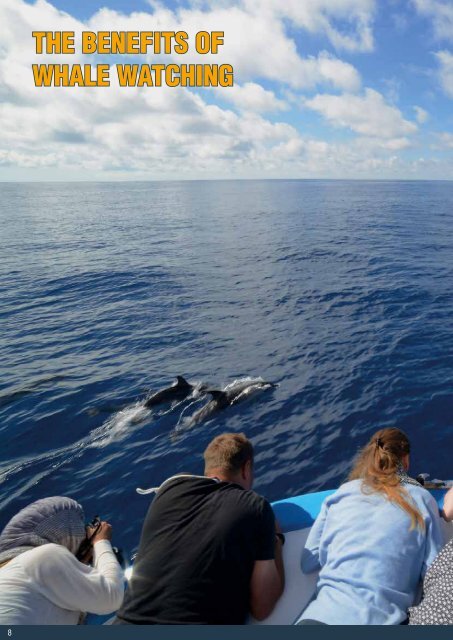Responsible Whale Watching
1gkqDcLwd
1gkqDcLwd
Create successful ePaper yourself
Turn your PDF publications into a flip-book with our unique Google optimized e-Paper software.
THE BENEFITS OF<br />
WHALE WATCHING<br />
THE BENEFITS OF WHALE WATCHING<br />
<strong>Whale</strong> watching has huge potential to deliver benefits to both people and whales,<br />
but it is essential that the experience on offer is of a sufficiently high standard to<br />
provide not only an economic benefit to operators and local communities, but<br />
equally important, benefit whale watchers; the whales, dolphins and porpoises<br />
(collectively known as cetaceans) and the marine environment as a whole.<br />
Benefits to whale watch passengers<br />
<strong>Responsible</strong> whale watching<br />
■■<br />
offers the opportunity to see whales and dolphins in their natural habitat rather<br />
than in a captive setting, and therefore to witness more natural behaviour.<br />
■ ■ offers the opportunity to learn about cetaceans and their natural environment,<br />
and also the threats they face (e.g. via leaflets & brochures, events, onboard<br />
narration, interpretation centres, etc.) On occasion, passengers may even<br />
experience first-hand an encounter with entangled, injured or otherwise distressed<br />
whales or dolphins and thus get to learn about the way to act in such<br />
situations.<br />
■ ■ often inspires advocacy for whales and dolphins, and their environment 2 .<br />
■■<br />
offers people living in whaling regions the opportunity to meet and foster an<br />
appreciation for live whales and thus promote attitude change.<br />
Benefits to research and conservation of whales and dolphins and their habitat<br />
Responsibly-managed whale watching vessels<br />
■■<br />
■■<br />
offer valuable platforms for benign research and data collection on the behaviour<br />
and ecology of whales and dolphins (including abundance and distribution;<br />
life history; behaviour and interactions with their environment; culture;<br />
threats, and health assessments).<br />
provide ‘eyes on the water’ and thus reduce the risk that watched whales and<br />
dolphins will be disturbed or even struck. They can also report important<br />
whale sightings or behaviours; identify entangled whales or whales in distress,<br />
and monitor them until expert assistance arrives.<br />
Economic benefits<br />
■■<br />
■■<br />
<strong>Whale</strong> watching offers an important source of income for coastal communities<br />
and regions, providing jobs and contributing to the development of the local<br />
tourism infrastructure.<br />
<strong>Whale</strong>s are long-lived creatures and, if watched responsibly, may be viewed<br />
in the wild over many decades. From an economic viewpoint (in addition to<br />
obvious conservation and ethical perspectives), they are therefore ‘worth’<br />
considerably more alive than dead 3 . In many regions, e.g. Iceland, the whale<br />
watch industry is many times more profitable than whaling 4 .<br />
© Fabian Ritter<br />
8 9


